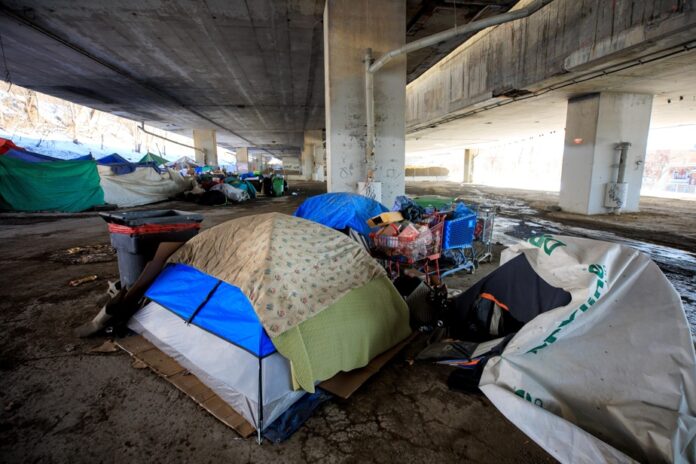Still threatened with eviction, the homeless who camp under the Ville-Marie highway get a new reprieve until June 15.
Superior Court Judge Suzanne Courchesne asked the Quebec Ministry of Transport (MTQ) on Monday to let campers live on her land until that date, in a decision rendered at the Montreal courthouse, which endorsed a agreement reached with the representatives of the homeless group.
In addition, the MTQ has submitted a plan to begin work immediately under the highway overpass, despite the presence of the camp, in areas where there will be no safety issue. The work areas will be protected by fencing.
“It’s another victory. It gives us time to continue to negotiate with the Government of Quebec to reach a humane solution for these people,” said the director of the Mobile Legal Clinic, Me Donald Tremblay, who represents the campers.
“We have to house them. They are not stray dogs or stray cats, they are people with very serious health problems, who need help. We have to ask ourselves, as a society, how we help the most vulnerable people. »
About fifteen homeless people have been living for several months, and some for several years, in tents under the highway, at the intersection of Atwater Avenue, near downtown Montreal.
The MTQ wants to evict them to carry out work there. A first eviction notice was served on campers last October, then postponed to March. But the Traveling Legal Clinic went to court on behalf of homeless people to delay their eviction. They had obtained a first reprieve until April 12, which was extended until April 22, then finally until June 15.
In March, the MTQ entered into an agreement to discuss ways to find accommodation for campers, adapted to their needs. But to date, no solution has been found by the CIUSSS de l’Ouest-de-l’Île de Montréal, which is responsible for the issue of homelessness in this sector, deplores the lawyer for the Clinic. traveling lawyer, Éric Préfontaine. According to Mr. Préfontaine, political intervention would “certainly help” to resolve the impasse.
“The government seems concerned about setting a precedent by finding specific solutions for those 15 to 20 people, but at the same time there are costs associated with the delay in the construction site,” he notes. So it would be much less costly to find a solution than to continue to add delays, which are costly to Quebec taxpayers. That’s a shame. »
Me Donald Tremblay said he was confident that the government would be in good faith in its desire to help campers.
Michel Chabot, a 58-year-old man suffering from cancer, who has lived in the camp for 10 months, was also optimistic as he left the courtroom. “The solution for me would be to have subsidized housing,” he said. I’m a sick person, I need help, I can’t get out of this on my own. »
Mr. Chabot had a meeting scheduled for Monday with CIUSSS stakeholders to discuss a solution that would be tailored to his needs. “We cannot put 15 people, including a pregnant woman, on the street. We’re already on the street! “, he remarked. “We saved deer in Longueuil, we should be able to save human beings in Montreal!” »
The leaders of the Résilience Montreal organization, which offers meals and support to campers, deplore the government’s lack of will to discuss with their stakeholders, who know the group and their needs well.
“For these people, it’s very difficult to get help, and they don’t trust just anyone,” says Maggie Chittspatio, a worker with Resilience Montreal. “They prefer to stay in touch with someone they trust. If we have to send them to another worker they do not know, they may refuse. »
Resilience Montreal proposed an action plan of 2.6 million over five years to relocate campers taking into account their needs, but it did not obtain a response from the government on this subject.


















